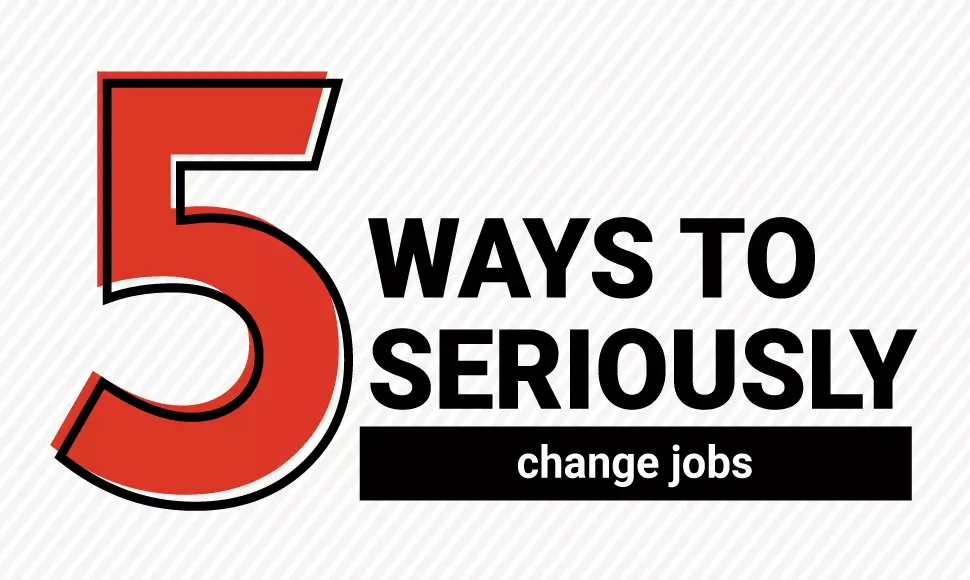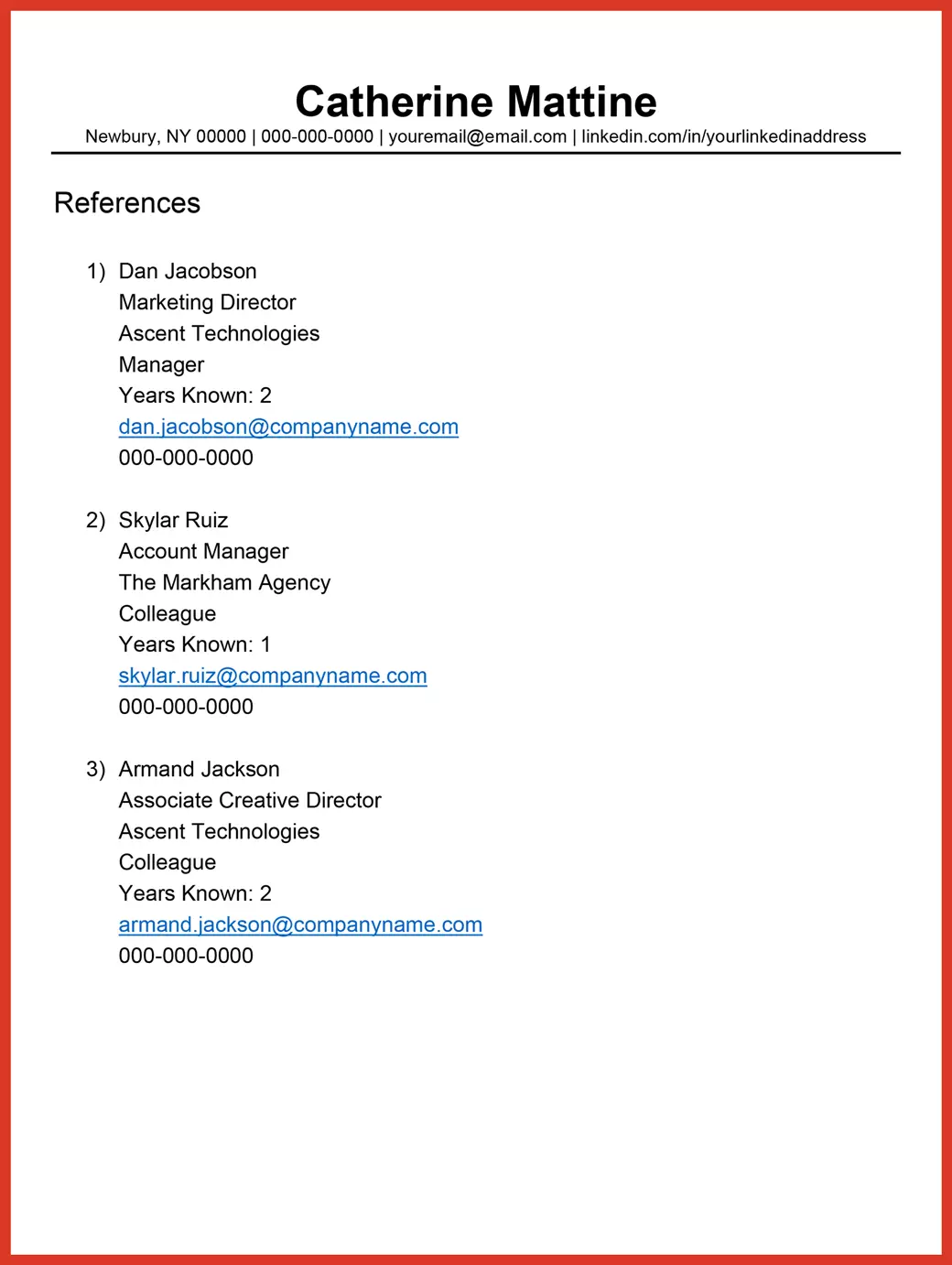The art of the job reference: Your guide to finding, recruiting and retaining the right references
Quick links
- Job references, also known as professional references, are individuals like co-workers or employers who can speak to your strengths, skills, and abilities at work.
- Recruit references with the ABOUT method (Ask early, Build relationships, Organize your ask, Utilize references carefully, Thank your references).
- After landing a job, express gratitude to your references through thank-you notes, emails or gestures. Maintaining positive relationships with references is essential for future professional interactions.
- If you need additional help, download our job references page sample and template below.

This article has been vetted by ∆þ…´ ”∆µ's editorial advisory committee.¬Ý
Read more about our editorial process.

Reviewed by Jessica Roper, MBA,¬ÝDirector of Career Services
This article was updated on December 13, 2023.
You’ve made it through the final round of interviews with a potential employer, and it’s down to you and another candidate. Will you make the cut? Will you get the job?
When it comes to you versus Job Candidate B, who vouches for your performance may be a difference-maker during the job search. But¬Ýhow do you find good job references? How do you ask them to recommend you? How can you help them help you?
∆þ…´ ”∆µ Career Coach¬ÝRicklyn Woods offers her best advice on everything you need to know ABOUT job references to highlight your skills to a potential employer. (Pay attention! That preposition is actually an acronym that will come in handy later.)
Sign up for our LinkedIn® newsletter to receive career planning tips, resumé help and more.
What are job references?
Job references, or professional references as they are sometimes called, are essentially co-workers or employers who can speak to your strengths, skills and abilities on the job. Generally, references should be people who’ve worked with you in some capacity or another, whether that’s as your manager, your colleague or your subordinate.
If you haven’t worked in a traditional office setting in a while (or ever), you can also reach out to business contacts, clients and vendors. Consider whom you partner with on a regular basis and who’s seen you demonstrate the kind of skills, leadership and innovation you want to bring to your next role.
“It has been said that it’s not what you know but who you know,” Woods says. “I like to take it a step further. It is really about who knows you. I may know a lot of people, but what they know about me is what matters most! If their perception of me is a positive one, then they would likely be more than willing to provide a stellar reference.”
When deciding whom to ask to be a reference, consider the following:
- Who would have good things to say about me?¬ÝYes, you want your references to be honest, but it‚Äôs best if that honest assessment is a positive one.
- Who would be as comfortable writing a letter of recommendation as speaking to someone about my strengths?¬ÝIt may be rare for letters of recommendation to be required, but it can still happen. Make sure your references are as comfortable on the keyboard as they are on the phone.
Everything to know about job references
Once you have a short list of potential job references, Woods recommends applying the acronym ABOUT to the process of recruiting them.
A ' Ask early
Woods says it’s wise to plant the seeds for references before you need them. “If you know you are going to be leaving an organization, you can say something like, ‘I’ve really enjoyed working with you. Would you be open to providing a reference for me in the future?’”
Also, ask (and re-ask) your references in every season of job hunting. “Don’t assume that because you asked before it’s OK to list them again without a heads-up,” Woods says. “First, if they’re caught off-guard, there may be stammering and stuttering. Second, it’s rude.”

Rarely will an employer ask to call your current supervisor, but if they do, have this statement memorized: “I have not made my current manager aware that I am considering career opportunities, but I am happy to provide contact information for a prior supervisor.”
B ' Build relationships
If you ask someone to serve as a reference in 2022, but it’s 2025 before you need that reference, make sure you’ve had contact between now and then. This doesn’t mean you have to set up a lunch date every week. It can be as simple as commenting on their social media posts or texting them a note of encouragement.
“Don’t just be a taker. You’ve got to give,” Woods explains.
Meanwhile, keep collecting potential references wherever you work, volunteer, attend class or collaborate. This isn’t to say that you should view others as a means to an end or create a false sense of camaraderie. Rather, when you truly click with people who might vouch for your leadership style, work ethic or creative problem-solving abilities, it’s wise to keep those contacts top of mind.
Ideally, Woods recommends, you accrue contacts who can advocate for you on three levels:
1. Manager: A former supervisor can speak to your performance.
2. Peer: A colleague can speak to your sense of teamwork.
3. Cross-functional team member: A co-worker in a different department can speak to what it’s like to collaborate with you.
For those who are switching careers, in the midst of a job search or entering the workforce for the first time, Woods says it’s OK to get creative. “There could be a professor or even a fellow student who might serve as a reference. If you’ve worked on a volunteer basis, your team leader could speak to your character or work ethic,” she says.

References are intended to let employers know how you¬Ýwork. If you only list personal references, you might ding your credibility.
read similar articles

5 ways to seriously know it's time to change jobs
O ' Organize your ask
When the time comes to actually rely upon your references, reach out to them with a heads-up about the job you’re seeking. Be organized! Send them your resumé and possibly even a copy of the job listing.
“Personally, I wouldn’t want the person to feel like I’m giving them work to do,” Woods says. But you do want the reference check to be seamless, so ask them what they want or need in order to be able to help you.
If they ask, you can describe the role and how they could position you for it. For example, you might say: “Because the company I’m applying to is in a season of rapid growth, if you’re willing, perhaps you could talk about how we worked together when our department grew at Company A.”
There is a fine line here. Woods cautions against trying to influence your reference in any way. “I want them to be able to answer the questions with their honest perceptions and opinions of me,” she says.

When you plan to launch a job search, it’s important for you to be organized. Keep your references in a handy place and have enough of them. Woods says the ideal number of references to have on hand at all times is five.
U ' Utilize references carefully
No matter how impressive your references’ names are, do not list their names on the precious real estate of your resumé. You don’t want the personal contact information of your references floating around. Guard their privacy as you would your own.
Neither should you say “References available upon request” on your resumé.
“This is old school and a red flag that you’re not up to the times. References are a given,” Woods says.

Ask your references for their contact information, even if you have it. “This will offer them the courtesy of giving their preferred method, and to be watching for a call or email,” Woods says.
T ' Thank your references
If you land the job, send a thank-you note with your new business card inside, take them out to coffee or offer some gesture that shows your gratitude. “I have always sent a nice thank-you note, text or email depending on my relationship with the reference,” Woods says.
Your gratitude will go a long way toward maintaining the relationship. (Not to mention it’s better for your contacts to learn you got the job from you rather than an updated social media profile!)

If a colleague has given a professional reference for you, it’s a great idea to offer your willingness to return the favor.
Now that you know ABOUT job references, it‚Äôs time to put your plan into action! And if you need a little more help, check out the¬Ýwealth of job resources¬Ý‚Äî from templates to career guides ‚Äî available on our website.
Click on the image to download our job references page sample and template.

ABOUT THE AUTHOR
A journalist-turned-marketer, Laurie Davies has been writing since her high school advanced composition teacher told her she broke too many rules. She has worked with ∆þ…´ ”∆µ since 2017, and currently splits her time between blogging and serving as lead writer on the University‚Äôs Academic Annual Report. Previously, she has written marketing content for MADD, Kaiser Permanente, Massage Envy, UPS, and other national brands. She lives in the Phoenix area with her husband and son, who is the best story she‚Äôs ever written.



